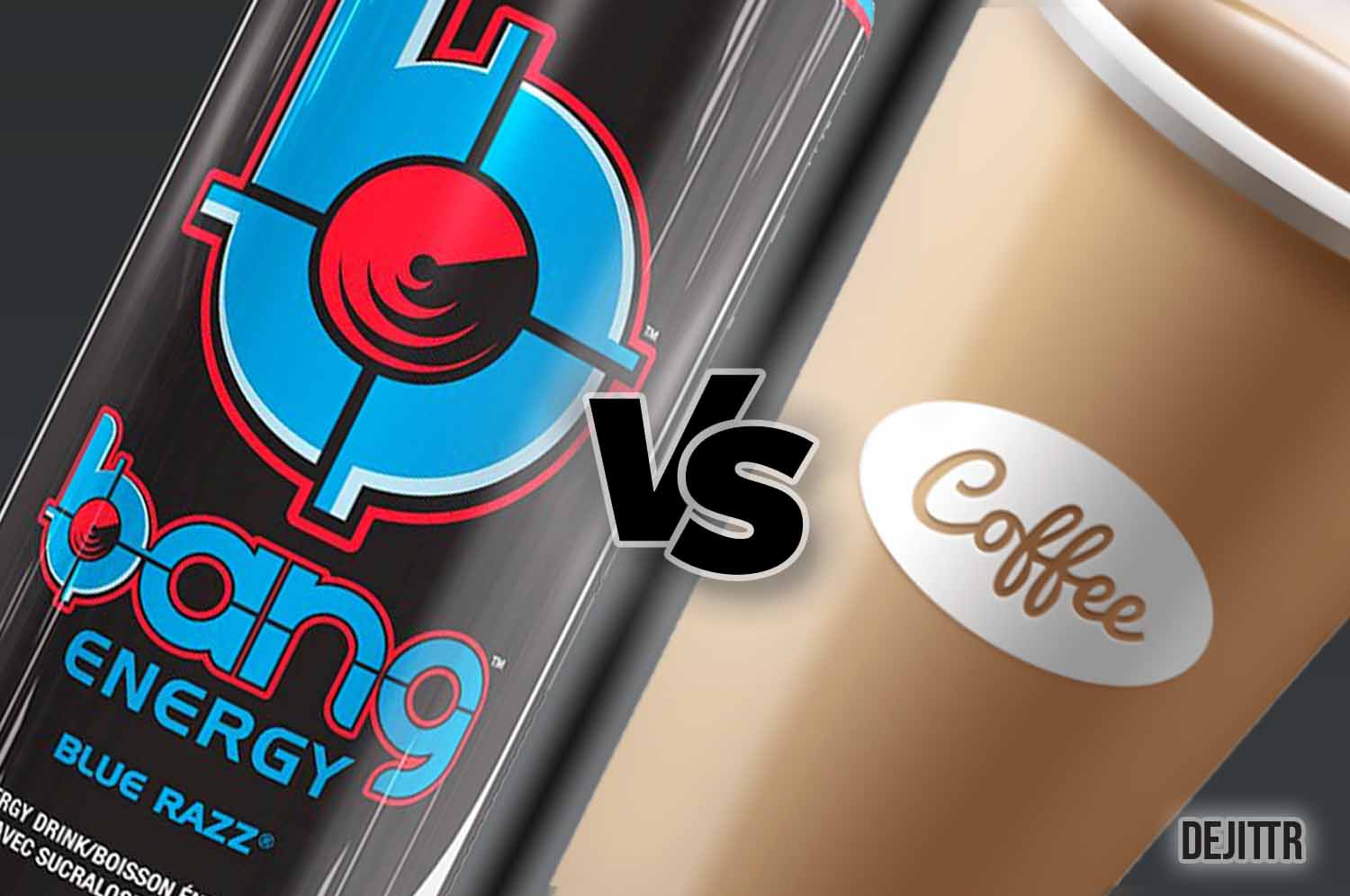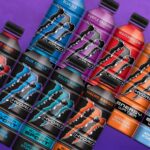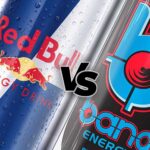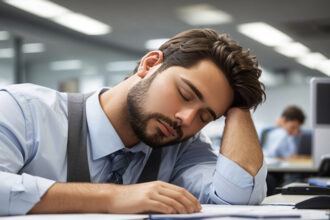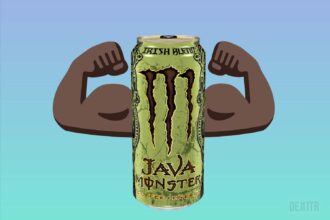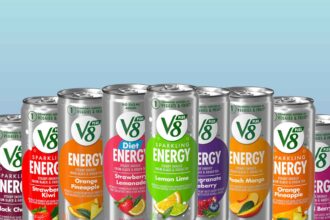Whether your work requires higher mental input or your workout needs a higher physical output, caffeine is one of the most recommended supplements for athletes, executives, gamers, and creatives. You can get an average caffeine dose from coffee or a larger pump from Bang Energy.
The main difference between Bang Energy and coffee is that Bang is the most “energy drink” of all energy drinks (300 mg caffeine), while coffee can start at a modest 64 mg dosage. Coffee gives you more control over how much or how little caffeine or sugar you want. Bang makes getting more caffeine more convenient. Coffee is more balanced and healthy.
In this article, we will review each option’s pros and cons alongside their best uses. By the end, you will know whether Bang Energy or Coffee is best for you and under which circumstances. Let’s start by comparing both at a glance.
| Coffee | Bang Energy | |
| Caffeine | 64 mg – 90 mg | 300 mg |
| Sugar | As added | No sugar |
| Essential Amino Acids | Absent | Present |
| Antioxidants | Present | Present |
| Best Use | As a regular wake-up beverage | Occasionally, before a big game |
| Worst Use | As a pre-workout supplement | As a regular morning beverage |
| Greatest advantage | Maximum control over ingredients | Maximum caffeine per sip |
| Greatest disadvantage | Requires effort | It is easy to overdose on |
Bang Energy: A Brief Overview
Bang Energy is a caffeinated beverage that contains sugar-free sweetener sucralose, like the zero-calorie versions of most energy drinks.
The two key differentiators for this product are its marketing and its taste, both of which are unlike other energy drinks.
As a result, it is the third best-selling energy drink in the US, following Red Bull (1st) and Monster Energy (2nd). When you choose an energy drink, knowing its popularity is important because energy drinks’ taste is responsible for their customer retention as much as their effectiveness.
One can estimate from Bang Energy’s popularity despite its smaller marketing budget that the drink does taste good. In fact, YouTube satirist Danny G made a video mocking Bang Energy’s marketing. When Danny took a sip, though, he had to admit that it did taste good.
Aside from having a mass-appeal-compatible taste and double the caffeine in coffee, Bang is the same as most energy drinks. It contains taurine but primarily uses a dose of caffeine to deliver an instant rush to its consumers. Here are the pros and cons of Bang Energy relative to coffee.
Bang Energy – Pros
Bang Energy might receive negative press for its marketing tactics and preference for excess, but it is the world’s third most popular energy drink brand, which means it must have some profound benefits.
Let’s look at the positive aspects of Bang Energy that might be contributing to its success.
Gives a Bigger Rush Than Coffee
Coffee contains 63 to 90 milligrams of caffeine, which is responsible for all the beverage’s stimulating effects. Bang contains 300 mg of caffeine, which is over 4 times as much as a shot of espresso. Obviously, this results in a more pronounced “rush”.
Healthline suggests that 200 to 400 milligrams is the optimum caffeine range for a pre-event energy boost. It is logical to assume that the 200 mg mark is for things like studying and being alert while gaming, and the 400 mark is for more physical activities like running and fight sports.
Bang hits the sweet spot between both, which gives it a special place for mass consumers.
Produces Prolonged States of Alertness and Focus
Bang Energy gives a very high “peak state,” as is reported by multiple consumers. This can be contrasted with a serious slump that follows.
But remember, kids: what goes up must come down!
And all energy drinks are no different. All peak states are followed by crashes (more on this below). The mettle of an energy drink is tested by how long it can maintain its peak state.
Bang Energy can give fresh consumers a 5-hour peak state while habitual consumers can sustain the Bang high for 3 hours. In other words, this specific benefit of Bang Energy is more pronounced for fresh consumers and declines a bit for regular consumers. However, it doesn’t bottom out as even daily consumers don’t report getting a caffeine crash within 3 hours.
Delivers Essential Amino Acids (EAAs)
This benefit helps Bang outshine Red Bull in some aspects. But when you contrast the beverage with coffee, it seems like apples to oranges comparison.
Coffee isn’t supposed to have essential amino acids. Nonetheless, someone not getting EAAs elsewhere will likely benefit from consuming Bang Energy more than coffee.
Doesn’t Have Sugar-Related Side Effects
Energy drinks’ caffeine content isn’t their only issue. They also contain plenty of sugar.
With coffee, you control how much sugar you add to the beverage but require a sweetener to offset the beverage’s bitterness. In Bang, there is no sugar.
You can get bang if you’re diabetic, pre-diabetic, or watching your sugar intake for health reasons.
For gamers, white-collar employees, and creatives who use energy drinks for work-related benefits, regular Bang can be a source of caffeine without the weight gain and consequent diseases that come from regular sugar consumption.
Bang Energy – Cons
Bang Energy’s marketing is loud and bold, with its loyalists unwilling to listen to anything negative about the beverage. But science doesn’t change based on preferences.
Every decision is a better one if it is made with enough knowledge. That’s why the side effects in this section must be considered before doubling down on Bang Energy.
Renders Other Energy Drinks Useless
Bang Energy has been controversial not because it contains more caffeine than coffee but because it contains more caffeine even by energy drink standards. It is worth noting that having more caffeine than coffee has become an energy drink staple since Monster Energy stepped on the caffeine accelerator.
Still, Bang Energy is considered dangerous. If you get used to a “Bang high”, you will not get it from a single serving of any other energy drink.
It is also crucial that Bang consumers understand that it is the exception to the two-can rule. When Red Bull started the energy drink category, it set a three-can rule for itself. If an adult consumed 3 cans of red bull in a day, he would not overdose on caffeine.
This became the two-can rule when other energy drinks tried to outshine Red Bull and over-caffeinated their beverages. Still, most did so by enough margin that one would need to buy two units to max out their daily allowable caffeine.
Bang has so much caffeine that once you drink one can, you have very little room to get any more caffeine elsewhere.
So don’t apply the two-can rule and open another container of any energy drink. If you have Bang Energy, you don’t need (and can’t have) any other energy drink. And if you stop having Bang, you will need to start consuming two cans of an alternative energy drink soon to replace a single can of Bang.
Can Lead To Deeper Slumps
As mentioned earlier, a caffeine high is almost always followed by a slump or a crash.
The depth of this slump is dictated entirely by how high the peak state is. While Bang Energy can deliver a prolonged peak state, it cannot prevent a slump. And a Bang slump is deep.
Can Make You Jittery
You’re mistaken if you think Bang’s sugar-free can is also a side-effect-free one. The high caffeine content can make anxious individuals jittery.
Even coffee can make you jittery and restless, but a smaller dose of caffeine is less likely to have this effect.
Can Have an Extreme Diuretic Effect
This is another side effect that is valid for coffee but is more pronounced in Bang Energy. Caffeine dehydrates the body and can upset your stomach. But in a smaller quantity, this effect is barely noticeable.
Generally, you can sip water to offset the dehydration caused by caffeine. But if you take 300 mg of caffeine in one sitting, you might not be able to offset it immediately.
Coffee: A Brief Overview
Coffee is one of the few natural sources of caffeine alongside cola leaves and cocoa. It is by far one of the healthiest sources of stimulants and has been widely adopted across the globe.
In America, a thriving coffee sub-culture combines coffee with social tasting and gatherings.
What separates coffee from energy drinks, in general, is that you can make your own coffee. While powdered energy drinks can be mixed at home, that’s not equivalent to brewing your own coffee.
Recommended Resource:
One of the goals of our website is to demystify ingredients such as caffeine. We create fun-to-read, in-depth, and medically-backed topics that our users love. Here’s another super helpful resource when you’re done reading this article.
Brewing your coffee gives you maximum control over the caffeine content of your beverage. You can also choose how much sugar you add to your cup if you add any (I recommend coffee without sugar).
These differences can be significant advantages if you compare them to an extreme energy drink like Bang Energy.
Coffee – Pros
The advantages of coffee are so many that they would take a whole article. Many of these advantages would also apply to energy drinks because of a common caffeine factor.
The benefits we cover in this section are mainly relative to Bang Energy but may generally contrast with energy drinks.
Can Stimulate in Moderation
Coffee’s effects range from helping you open your eyes in the morning to getting you pumped up for the day. Coffee can provide a wide range of stimulation. This depends on your caffeine tolerance and how much coffee essence is in your coffee.
Where black tea is the least caffeinated stimulating beverage, and Bang Energy is one of the most caffeinated beverages, coffee provides much-needed moderation.
Available at Different Price Points
Coffee is to Bang what Bang is to other energy drinks. Bang might be a budget energy drink, but you cannot get Bang as cheap as a cup of self-brewed espresso. This makes coffee a choice that is wiser for the wallet.
Can Be Consumed Socially
A key benefit of coffee is that it can be enjoyed with friends and family. It takes time to finish, which makes it an excellent social beverage (or when studying).
You can sip energy drinks at a BBQ party, somewhat socially. Bang just isn’t such a drink. 🙂 It is too stimulant-packed to be consumed as an add-on beverage at an event.
Easy to Swap Brands
As mentioned in the drawbacks of Bang Energy, it is so addictive that it can’t be replaced by a single serving of any other energy drink. With coffee, you have more choices because you can swap brands and still get the same stimulation.
You can have many reasons to swap coffee brands, including price, accessibility, and taste. None of those reasons will affect your caffeine habit or dependence.
Coffee – Cons
Coffee’s caffeine-related drawbacks are minimal in comparison to Bang. That doesn’t mean you can’t feel caffeine jitters by having coffee, but you’re more likely to experience them with Bang Energy.
That’s why a bulk of coffee’s side effects don’t get covered here because they are also present in Bang Energy. Here are a few cons that apply to coffee compared to Bang.
It Doesn’t Contain Essential Amino Acids
This is a drawback worth considering unless you get your essential amino acids elsewhere.
But if you take care of your diet and don’t have specific deficiencies, this isn’t as much of a disadvantage as it lacks an added benefit. Still, Bang does come out on top in this aspect.
It Might Not Give as Much Stimulation
This drawback applies if you are used to energy drinks. Even the mildest energy drinks pack a more significant punch than coffee.
It might take multiple cups of coffee to feel as energized if you kick energy drinks in favor of coffee.
More importantly, if you associate your caffeine high with the taste of an energy drink, coffee won’t make you as alert. On the other hand, ditching coffee in favor of energy drinks will not make you feel lacking in energy or alertness.
It Takes Effort to Make
Finally, Bang is far more convenient than coffee.
Coffee requires ingredients including beans, brewing equipment, and filtered water. Bang is already present in a convenient, dense can full of energy.
You can, of course, get coffee from a cafe, but not as cost-effective, and you never know what’s in it. If you’re willing to get in line and receive a less stimulating serving, you can choose coffee instead of Bang Energy.
Coffee vs. Bang Energy: What Should You Drink?
You should drink coffee if you’ve not had well-caffeinated beverages before. It is better to get the most out of a moderate amount of caffeine.
Bang Energy is better as a one-off product on days when you’re really dragging (especially for physical tasks). Coffee is a much healthier and balanced choice for everyday consumption.


